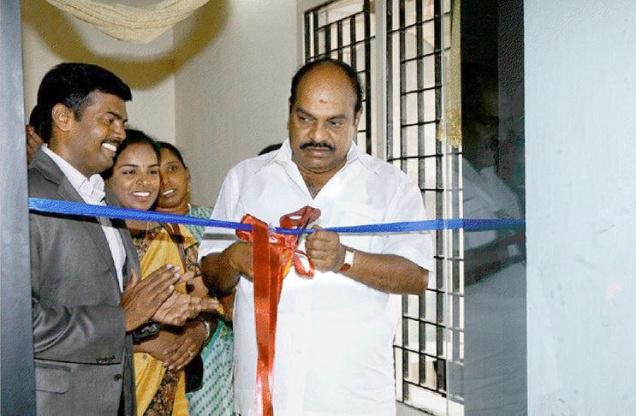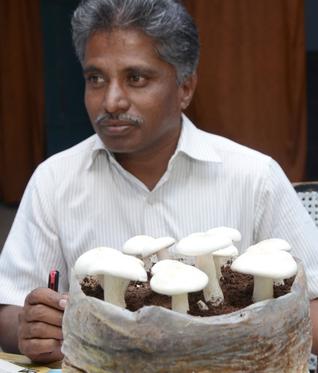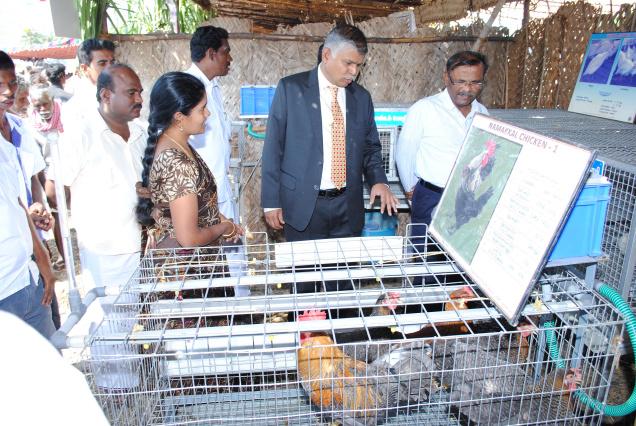Tamil Nadu lagging behind Himachal Pradesh, Delhi, Punjab and Haryana
Mushroom production has tremendous scope in Tamil Nadu.
However, the State does not have the number of entrepreneurs to meet its requirements, laments S.S.T.Rajenthran, who won the “progressive mushroom grower” award in 2011 from the Director of Mushroom Research, Indian Council of Agricultural Research, “for his outstanding contribution to the mushroom industry.”
Mr.Rajenthran, 46, is an ITI-educated entrepreneur who is into mushroom production for the past over 25 years. He has a unit near Thuraiyur, about 25km from here.
The ICAR has recognised his expertise in milky and oyster mushroom cultivation. He also supplies high quality spawn to mushroom growers.
It has commended his “keen interest in providing support to small and marginal mushroom growers and his efforts in popularising mushroom consumption among common public.”
Mushroom has excellent medicinal properties. It is rich in protein, fibre, and amino acids. Mushroom is a 100 per cent vegetarian food and is good for diabetes and joint pains. Pickles, pappad, soup powder, health powder, capsule, health drinks and pakodas can be made using mushroom. It has no cholesterol and helps in purifying blood. It has low sodium and substantial vitamin and minerals.
Mr.Rajenthran calls it an “agri-based industry.” But officially it has been classified as horticulture. India is so gifted that it could grow temperate, sub-tropical, and tropical mushrooms.
During 1989-92, marketing of mushroom was a problem in Tamil Nadu. “It is no more so. Chennai alone gets five tonnes of mushroom a day at present from various parts of the country.”
“However, Tamil Nadu is now nowhere in the national map and it is Himachal Pradesh, Delhi, Punjab, and Haryana which are doing well in this sector.” It has good export potential for countries such as China, Singapore, Dubai, and Europe.”
“It is quite remunerative and fetches at least Rs.200 a kg at present. The profit margin is 30 to 40 per cent.”
Mr.Rajenthran, who is now concentrating on milky mushroom cultivation, says that its shelf life could be five days as against one day of button mushroom. If kept refrigerated, milky mushroom could be kept for 10-15 days.
With respect to reports that mushroom could be cultivated at low cost – even as low as Rs.50, 000 to Rs.1lakh, he says, “Whenever you use timber for the production chamber, there is every possibility fungus might affect the timber which in turn would hurt the mushroom in due course,” he contends. Hence, investment is a major problem for the entrepreneurs, he adds.
According to him, mushroom production requires a temperature of 28 deg C to 35 deg C and a humidity of 75-80 per cent. Hence a humidifier is a must. Besides CO2 should be totally removed from the chamber and there should be fresh air.
For a production unit of 30 X 15 ft, a minimum of Rs.9 lakh would be required. A crop requires 45 days and at least 1.5 tonnes could be harvested per crop. “On an average, 10 tonnes per unit is possible per annum.”
Besides, he suggests that one set up a spawn and compost unit at Rs.25 lakh so that he could supply spawn and compost ready to produce mushroom within a radius of 50 to 100 km.
Mr.Rajenthran, who advocates organic farming of mushroom, suggests that the State government introduce mushroom in the noon meal scheme to serve nutritional food to children and promote mushroom industry. Self-help groups could produce the same and supply, he adds.
Mushroom production requires very little land and can be a good source of employment for educated youth. The two primary inputs for mushroom production – agro-waste and labour are easily available. Integrated mushroom production in existing farming system will supplement the income of rural masses and will lead to inclusive growth, he adds.
source: http://www.TheHindu.com / Home> News> Cities> Tiruchirapalli / by G. Sathyamurthi / Tiruchi, February 03rd,2013



